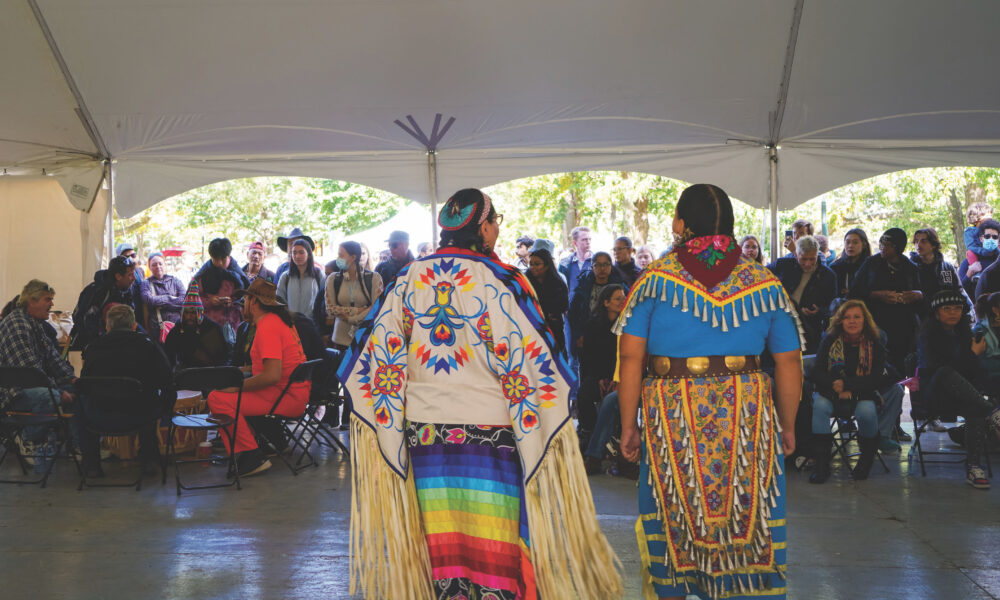On Sept. 23, with hundreds of people in attendance, McGill’s First Peoples’ House hosted the 21st annual Pow Wow at Lower Field. It had been two years since the last in-person Pow Wow, so this installment reintroduced Pow Wow to the grounds. Indigenous and non-Indigenous students, faculty, and community members were invited to safely gather and share a site of learning, music, and joy on the sunny and lively lawn. Activities scheduled throughout the day, such as traditional and inter-tribal dancing, Inuit throat singing, and a Maori Haka performance, took place under a large white tent that served as the centre stage.
The event began at 11 a.m. with opening words followed by the Grand Entry. Elder and veteran Ray Deer, chief of the Kahnawake Royal Canadian Legion, carried the Canadian flag amongst others carrying the Haudenosaunee Confederacy flag and an Every Child Matters flag, accompanied by drumming from groups including the host drum, the RedTail Spirit Singers, and the co-host drum, the Ottawa River Singers.
Emcee of the event and journalist Lance Delisle highlighted the importance of the event’s community elements in an interview with The McGill Tribune.
“Pow Wow is an opportunity for traditional and non-traditional people––meaning Native and non-Native––to get together and share culture, share ideas, share dances, share celebration,” Delisle said.
Delisle spoke to the Pow Wow being a “homecoming” and a space for sharing, both in the wake of the COVID-19 pandemic and also as a Kanien’kehá:ka person, given that McGill is located on unceded Kanien’kehá:ka land.
“We have been so separated from each other culturally, spiritually, harmoniously,” Delisle said. “We are bringing that warmth by [this] connection, and certainly […] the humanity back. Pow Wow reminds ourselves that we are […] a whole people.”
Among the many vendors and organizations in attendance was McGill’s Indigenous Student Alliance (ISA). Leon Picha, U3 Management and member of the Kwantlen Nation, got involved with the ISA in his first year as a way to stay connected to Indigenous communities when his own was far away. The Pow Wow reminded Picha of his first introduction to the Indigenous community at McGill, though it will be his last as a student.
“It is a beautiful close,” said Picha, who will graduate in June 2023. “Aside from the National Day of Truth and Reconciliation, this is the last time that I am going to see the Indigenous community as a whole at McGill.”
Jenni Makahonuk, co-chair of the ISA and member of the Lac Seul Nation, echoed Picha’s sentiments. In addition to educational events hosted by the ISA, Makahonuk leads an Anishinaabe and Ojibwe language study group on Wednesdays and helped design one of McGill’s 400-level Indigenous Studies seminar.
“It’s really hard for me to connect to [Indigenous] culture [here] because I am not from Montreal,” Makahonuk said in an interview with the Tribune. “Having Pow Wow helps me connect back to my values and who I am.”
At around 1 p.m. in the main tent, Nina Segalowitz, an Inuit throat singer, activist, and caseworker at the Centre des femmes de Montréal, took the floor to share stories and songs with the crowd. Throat singing has a long history in Inuit cultures: It was almost erased during colonization after the Catholic church attempted to suppress the practice under the pretense that it was a “form of devil worship.”
When she became a mother, Segalowitz made a pointed effort to incorporate the practice into her children’s everyday experience. Standing with her daughter, Sierra, the two performed a game in which each sang part of a song to see who could sing the longest.
Singing with close friend Sarah Carriere and telling stories about the Canadian government’s mass killing of Inuit peoples’ sled dogs, Segalowitz and Carriere shared a single microphone so that they could feel each other’s breathing, each other’s heartbeat.
“We are still resilient. We are still here,” they both said.










Pingback: Say no to the colonial status quo - The McGill Tribune